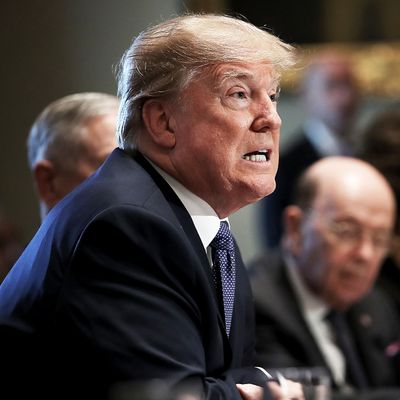
It has long been clear that Donald Trump believes a mass-casualty terror attack on U.S. soil wouldn’t be all bad. As both a candidate and president, Trump has claimed vindication (and “appreciate[d] the congrats”) whenever Muslim terrorists perpetrated acts of mass violence in the United States or in Europe. He has also predicted that future terrorist attacks would teach critics — including the pope and “the court system” — not to doubt the wisdom of his policies.
This enthusiasm for touting terrorist attacks as proof of his own judgment has often led Trump to declare “I told you so” before the most basic details about a given attack have even been confirmed. On occasion, the president has simply invented Islamist terrorist attacks out of whole cloth.
And then, two weeks ago, the Washington Post reported this disconcerting anecdote:
In private conversations, Trump has told advisers that he doesn’t think the 2018 election has to be as bad as others are predicting. He has referenced the 2002 midterms, when George W. Bush and Republicans fared better after the Sept. 11 terrorist attacks, these people said.
It’s unclear whether Trump explicitly referred to the 9/11 attacks, or if the Post’s reporters just inserted that clause for context. But given how large those attacks loomed in November 2002, it was, at least, an uncomfortable analogy for the president to draw.
Now, on the afternoon before his first State of the Union address, the president has made his belief that a massive terror attack would have beneficent political consequences explicit.
Here, Trump is clear that he would prefer to see America achieve a “great form of unity” without a “not good” major event happening first. And he does not say — or come close to saying — that, by inspiring national unity, a terrorist attack would be a net positive for the country (an argument that some “serious intellectuals” did make in the aftermath of 9/11).
But he does say that it will be difficult to bring about the political environment he wants to see, absent a bad major event.
Given that nearly 60 percent of the country neither trusts nor respects Donald Trump, it seems highly unlikely that he would actually benefit politically from failing to “make America safe again.” But such a failure would probably, nonetheless, help to legitimate his existing efforts to undermine liberal norms and consolidate his influence over federal law enforcement, at least to his fellow members of the Republican Party.






























